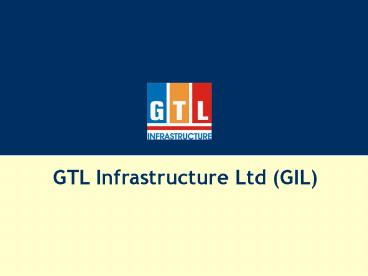GTL Infrastructure Ltd GIL - PowerPoint PPT Presentation
1 / 12
Title:
GTL Infrastructure Ltd GIL
Description:
Category 'C' circles continue to witness the highest rate of growth ... Tata Teleservices. 4500. 5000. Reliance Infocom. 6000. 10000. Bharti. 12000. 20000. Hutch. 8000 ... – PowerPoint PPT presentation
Number of Views:107
Avg rating:3.0/5.0
Title: GTL Infrastructure Ltd GIL
1
GTL Infrastructure Ltd (GIL)
2
Telecom scenario in India
- Growth of telecommunication in India is driven by
wireless telephony - Explosive Growth
- Current approx 85 million subscribers
- Target by 2008 approx 250 million subscribers
- Category C circles continue to witness the
highest rate of growth
Feb 2006 data source COAI
3
Does shared infrastructure makes sense?
To reach the rollout targets, approx capex
required in telecom infrastructure alone is to
the tune of US 20 Bn in next 3 years
4
Does shared infrastructure makes sense?
Average Revenue Per User(ARPU) Rs.374 expected to
be less than Rs.200 (ltUS 5) per month once the
Rural India is covered Capex per
Subscriber/connection should come down at least
by 30 - 40 if Operators have to be profitable
in Semi-urban/Rural segments of the market Cost
of electronics in per line cost has come down and
cost of infrastructure has gone up and
constitutes up to 65 of the per line cost today
Depending on number of operators sharing the same
cell site infrastructure for housing their
electronics, effective cost of cell site for each
operator reduces by 30-40
5
Shared Telecom Infrastructure
- Telecom Infrastructure consists of
- Passive Infrastructure
- Tower
- Shelter
- Foundation/Civil Work
- Outdoor/Indoor Electrical
- Power Supply/DG sets
- Optical Cables/Ducts
- Active Infrastructure
- Electronic Equipment
- Antennas
- Third party - Infrastructure sharing will be more
effective as the Telecom Operators competition
will not hamper co-operation. - High leverage of assets will ensure good early
revenue streams and consequently the ability to
finance rapid roll-out
6
Benefits of Sharing
- Sharing model provides cost, scale and time
benefits to the Telecom operators - Conserves CAPEX and allows Telecom operators to
enhance coverage and penetration - Reduces OPEX and eliminates the need for Telecom
Operators to manage the issues related with real
estate and maintenance - Facilitates Telecom Operators to meet the
mandated coverage requirements in low density
areas such as rural and suburban. - Saves Time to Market by providing an existing,
telecom ready facility, with consistent quality - Freeing of capital for core areas like technology
and new services
7
Challenges
- To be considered as core infrastructure
developers - Extremely capital intensive
- Attractive terms of investment needed to source
equity/debt funding - Cost effective solutions to attract Telecom
Operators
8
Our Proposal
- To extend Income Tax benefits under section
80 - I A - Granting Infrastructure status under section
10-23(G) to developers of Telecom Infrastructure
as a separate entry under sec. 80-I A (4)
Extending benefits to developers without any loss
to the exchequer
9
Justification
- The Income Tax Act under sec. 80-I A(4) (ii)
extends Income tax benefits to - The telecom operators who are developing their
own telecom infrastructure. - The developers of other infrastructure like
roads, ports,highways, water supply projects etc. - Government of India is committed to provide Rural
telephony at affordable prices
10
Justification
- Whilst prices of electronics as well as rate of
customs duty is coming down, prices of passive
infrastructure comprising of land, steel, cement
etc. is going up. - Income Tax rules allows each operator to claim
depreciation benefits on their capex. Common
network on shared basis thus would reduce overall
depreciation benefits. - Shared infrastructure service provided to the
operators would generate additional service tax
revenue
11
Benefits
- Benefits to the Revenue and economy
- Overall depreciation allowance by the department
will be reduced - Efficient use of capital in the economy
- Additional service tax revenues
- Benefits to the Consumers
- Lower cost of operations to reduce tariffs
- Penetration in the rural areas as sharing is the
only viable alternative
12
Thank You































